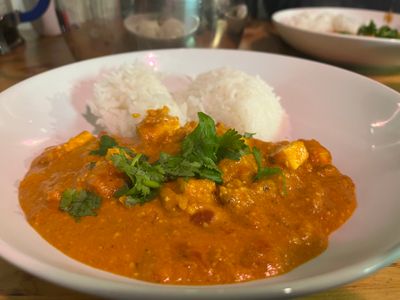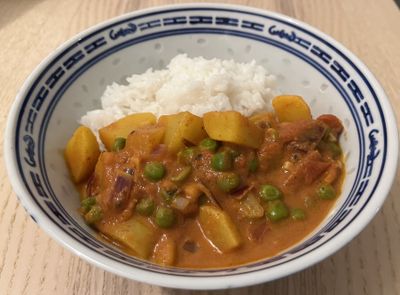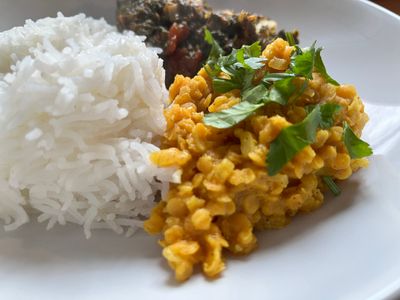Roopa Gulati's Palak Paneer: Curry with Spinach and Indian Cheese
Palak paneer is a classic Indian curry with spinach and fried cheese. Very simple and very tasty.
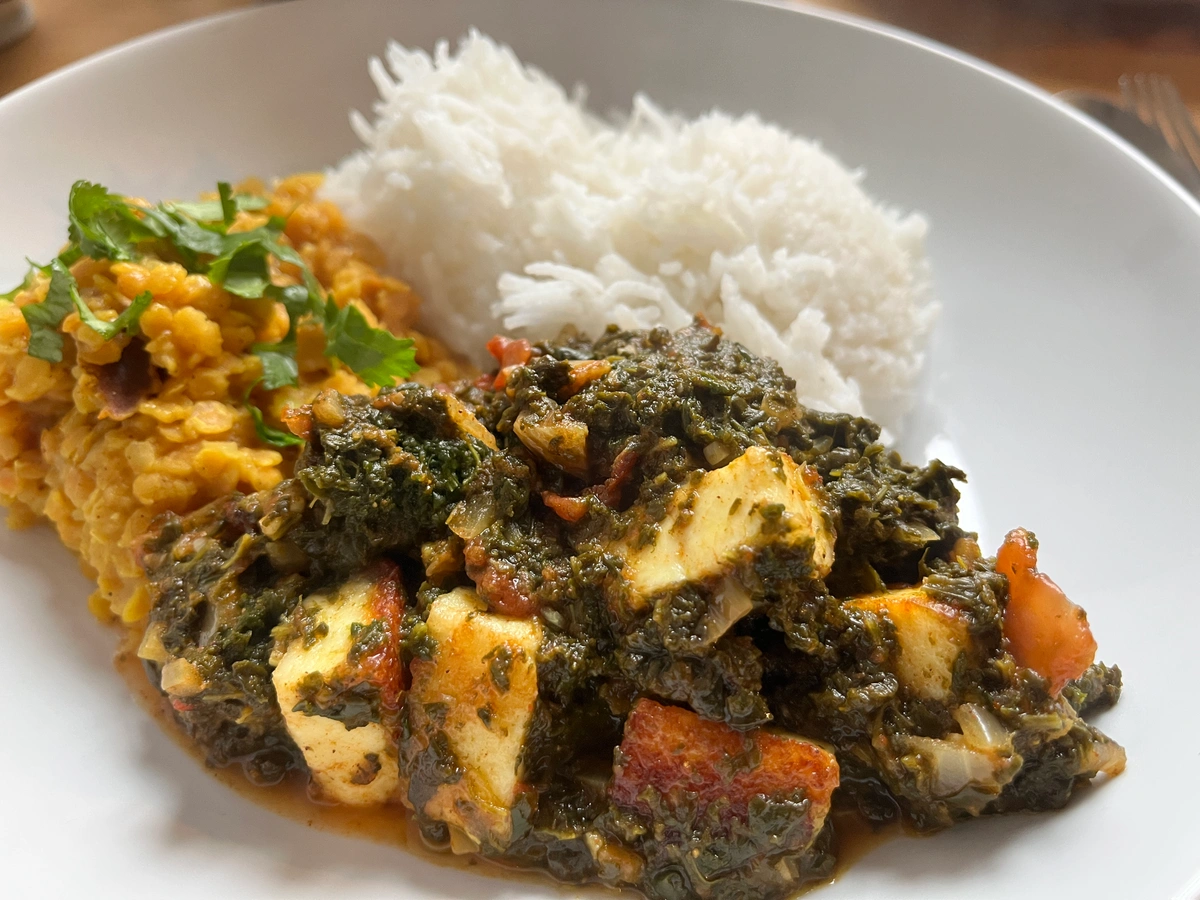
Image credit: Max Alletsee
Recipe Categories:
Palak paneer is an Indian curry that combines spinach, paneer, and great spices. It is a classic in Indian cuisine and can be found on the menu of any Indian restaurant, but it is also relatively easy to make at home.
The spices roasted in the pan at the beginning give the curry a wonderful flavor. Indian cooks know how to extract incredible flavors from just a few grams of spices.
Paneer can now be found in the chilled section of any well-stocked supermarket. However, it can sometimes be quite firm on the block. A little trick can help: if you dice the paneer, put it in a bowl, pour boiling water over it, and wait for 10-15 minutes, the cheese will soften and become better.
If you don’t want rice as a side dish, you can substitute naan, an Indian flatbread.
This recipe is based on one in India - The World Vegetarian by Roopa Gulati (publisher’s website). Anyone interested in Indian cuisine will find not only great curries in this cookbook, but also an explanation of basic techniques and a separate chapter on Indian breads and savories.
Recipe
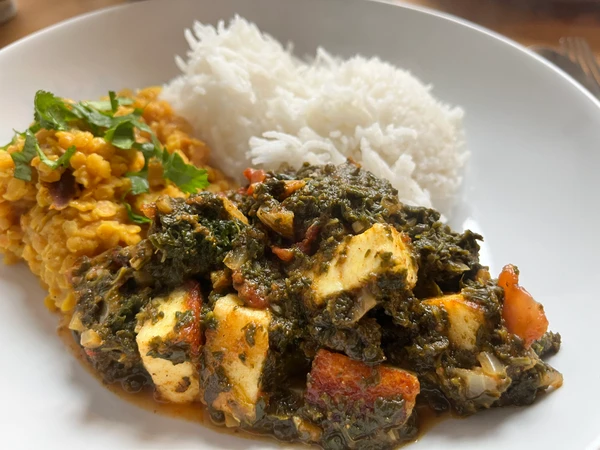
A plate of two curries: the palak paneer in the foreground and a lime dal with lemon and lentils in the background on the left.
Ingredients
Preparation Time: 10 min
Total Time: 45 min
Servings: 2
- • 1 onion
- • 2 cloves of garlic
- • 25 g ginger
- • 2+2 tablespoons oil
- • 1 teaspoon cumin seeds
- • 1 teaspoon cinnamon
- • 1 teaspoon tomato purée
- • 150 g spinach
- • 300 g canned tomatoes
- • 1 pinch of turmeric
- • 1 pinch of chili powder
- • 1 pinch of salt
- • 1/2 teaspoon garam masala
- • 100-150 g paneer (Indian cheese)
- • as a side dish: about 120 g of rice
Ingredients
Servings: 2
Preparation Time: 10 min
Total Time: 45 min
- • 1 onion
- • 2 cloves of garlic
- • 25 g ginger
- • 2+2 tablespoons oil
- • 1 teaspoon cumin seeds
- • 1 teaspoon cinnamon
- • 1 teaspoon tomato purée
- • 150 g spinach
- • 300 g canned tomatoes
- • 1 pinch of turmeric
- • 1 pinch of chili powder
- • 1 pinch of salt
Instructions
- 1 If you are using store-bought paneer, which is quite firm, cut it into cubes and place in hot water for about 10 minutes - this will make it softer and more digestible.
- 2 Peel and chop the onion, garlic, and ginger.
- 3 Heat 2 tablespoons of oil in a large frying pan. Fry the cumin and cinnamon briefly in the oil, then add the onions. When the onions are soft, add the garlic and ginger and cook for about 5 minutes. Meanwhile, add the tomato purée to the pan.
- 4 Wash the rice and bring to the boil with double the amount of water and a little salt, then simmer on a low heat according to the packet instructions.
- 5 Add the spinach to the onion, garlic, and ginger mixture and deglaze with the canned tomatoes. Season with turmeric, chili powder, garam masala, and salt. Cover the pan, bring to the boil, and simmer on a low heat for about 15 minutes.
- 6 Heat 2 tablespoons of oil in a frying pan and fry the paneer cubes until golden brown.
- 7 Add the fried paneer cubes to the rest of the curry, season to taste, and serve with rice.
Carbon Footprint
Carbon Footprint: 2227 g CO₂e
This ranks it number 43 out of 57 recipes published on the blog so far in terms of estimated carbon footprint.
This means that at least three quarters of the recipes published here on the blog so far have a better estimated carbon footprint than this recipe. 🙁
Looking at the individual ingredients, paneer stands out: it accounts for only about 15% of the ingredients, but more than 40% of the carbon footprint. The production of the 100-150g of paneer in our recipe generates almost 900g of CO2 emissions.On the other hand, the vegetables used have a very good carbon footprint - for example, the onions, spinach, and canned tomatoes. The spinach scores very well despite the need for a cold chain: growing it is climate-friendly and freezing it also ensures a longer shelf life and less food waste.
Comparison of Ingredients
| Ingredients | Carbon footprint per kg | Carbon footprint for recipe | % of ingredients | % of CO₂ emissions |
|---|---|---|---|---|
| onion | 0.2 | 16 | 9% | 1% |
| garlic | 0.5 | 3 | 1% | 0% |
| ginger | 0.5 | 11 | 3% | 1% |
| oil | 3.2 | 128 | 5% | 6% |
| cumin | 1.1 | 1 | 0% | 0% |
| cinnamon | 1.1 | 1 | 0% | 0% |
| tomato paste | 4.3 | 22 | 1% | 1% |
| spinach (frozen) | 0.6 | 90 | 17% | 4% |
| canned tomatoes | 1.8 | 540 | 35% | 24% |
| turmeric | 1.1 | 1 | 0% | 0% |
| chili powder | 1.1 | 1 | 0% | 0% |
| salt | 1.4 | 3 | 0% | 0% |
| garam masala | 1.1 | 1 | 0% | 0% |
| paneer | 7.1 | 889 | 15% | 40% |
| rice | 3.1 | 372 | 14% | 17% |
| Cook: curry | 61 | 3% | ||
| Cook: rice | 37 | 2% | ||
| Fry: paneer | 51 | 2% |
Instructions
- 1 If you are using store-bought paneer, which is quite firm, cut it into cubes and place in hot water for about 10 minutes - this will make it softer and more digestible.
- 2 Peel and chop the onion, garlic, and ginger.
- 3 Heat 2 tablespoons of oil in a large frying pan. Fry the cumin and cinnamon briefly in the oil, then add the onions. When the onions are soft, add the garlic and ginger and cook for about 5 minutes. Meanwhile, add the tomato purée to the pan.
- 4 Wash the rice and bring to the boil with double the amount of water and a little salt, then simmer on a low heat according to the packet instructions.
- 5 Add the spinach to the onion, garlic, and ginger mixture and deglaze with the canned tomatoes. Season with turmeric, chili powder, garam masala, and salt. Cover the pan, bring to the boil, and simmer on a low heat for about 15 minutes.
- 6 Heat 2 tablespoons of oil in a frying pan and fry the paneer cubes until golden brown.
- 7 Add the fried paneer cubes to the rest of the curry, season to taste, and serve with rice.
Carbon Footprint
Carbon Footprint (2 portions): 2227 g CO₂e
This ranks it number 43 out of 57 recipes published on the blog so far in terms of estimated carbon footprint.
This means that at least three quarters of the recipes published here on the blog so far have a better estimated carbon footprint than this recipe. 🙁
Looking at the individual ingredients, paneer stands out: it accounts for only about 15% of the ingredients, but more than 40% of the carbon footprint. The production of the 100-150g of paneer in our recipe generates almost 900g of CO2 emissions.On the other hand, the vegetables used have a very good carbon footprint - for example, the onions, spinach, and canned tomatoes. The spinach scores very well despite the need for a cold chain: growing it is climate-friendly and freezing it also ensures a longer shelf life and less food waste.
Comparison of Ingredients
| Ingredients | Carbon footprint per kg | Carbon footprint for recipe | % of ingredients | % of CO₂ emissions |
|---|---|---|---|---|
| onion | 0.2 | 16 | 9% | 1% |
| garlic | 0.5 | 3 | 1% | 0% |
| ginger | 0.5 | 11 | 3% | 1% |
| oil | 3.2 | 128 | 5% | 6% |
| cumin | 1.1 | 1 | 0% | 0% |
| cinnamon | 1.1 | 1 | 0% | 0% |
| tomato paste | 4.3 | 22 | 1% | 1% |
| spinach (frozen) | 0.6 | 90 | 17% | 4% |
| canned tomatoes | 1.8 | 540 | 35% | 24% |
| turmeric | 1.1 | 1 | 0% | 0% |
| chili powder | 1.1 | 1 | 0% | 0% |
| salt | 1.4 | 3 | 0% | 0% |
| garam masala | 1.1 | 1 | 0% | 0% |
| paneer | 7.1 | 889 | 15% | 40% |
| rice | 3.1 | 372 | 14% | 17% |
| Cook: curry | 61 | 3% | ||
| Cook: rice | 37 | 2% | ||
| Fry: paneer | 51 | 2% |
